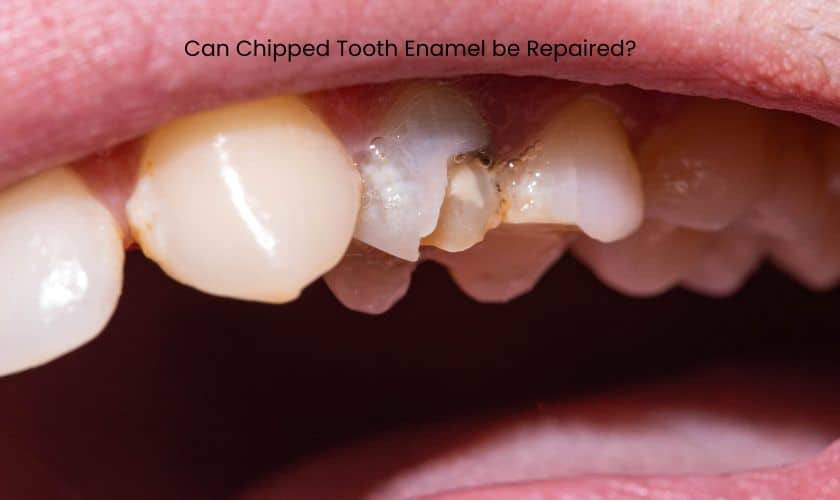
Your smile is your signature, but what happens when a chipped tooth threatens its brilliance? Can chipped tooth enamel be repaired? In this comprehensive guide, we delve into the intricacies of dental care, exploring causes, solutions, and preventive measures to keep your smile shining bright.
Can Chipped Tooth Enamel be Repaired?
Chipped tooth enamel, while unsettling, is a common dental issue that can be effectively treated. Tooth enamel is the protective outer layer of your teeth, safeguarding against decay and damage. When this enamel becomes chipped or fractured, it exposes the underlying dentin, leading to sensitivity and potential complications if left untreated.
What Happens if You Chip Tooth Enamel?
A chipped tooth enamel can result from various factors, including accidents, trauma, biting into hard objects, or tooth decay. While minor chips may seem harmless, they can escalate into more significant concerns if ignored. Symptoms of a chipped enamel include sensitivity to hot or cold foods, pain while chewing, and rough edges along the tooth surface.
What to Do if My Tooth Enamel is Broken?
If you’ve chipped your tooth enamel, prompt action is crucial to prevent further damage and restore dental health. Start by rinsing your mouth with warm water to clean the area and alleviate discomfort. If there’s bleeding, apply gentle pressure with a clean cloth or gauze. Next, assess the severity of the chip. Minor chips may not require immediate intervention but should still be evaluated by a dentist to prevent complications.
How to Repair a Chipped Tooth Enamel
The good news is that chipped tooth enamel can be repaired in most cases. The specific treatment option your dentist recommends will depend on the severity of the chip, its location, and your individual needs. Here are some common repair methods:
1. Dental Bonding:
This is a popular choice for minor chips, especially on front teeth. Bonding uses a tooth-colored composite resin that’s sculpted and hardened using a special light to perfectly mimic the shape and color of your natural tooth. The procedure is minimally invasive, usually requires no anesthesia, and can be completed in one visit.
2. Veneers:
For larger chips or those that significantly affect the tooth’s aesthetics, veneers might be a better option. Veneers are thin shells of porcelain or composite resin that are custom-made to fit over the front surface of the tooth. They offer a more durable and long-lasting solution compared to bonding, but the procedure requires removing a small amount of enamel from the tooth and typically takes multiple appointments.
3. Crowns:
If the chip is extensive or the tooth is severely damaged, a crown might be necessary. A crown is a cap that completely encases the entire tooth, restoring its strength, shape, and size. Crowns can be made from various materials, including porcelain, metal, or a combination of both, and offer the most durable solution for repairing a chipped tooth.
4. Root Canal (in severe cases):
In rare instances, a large chip might expose the tooth’s pulp, the innermost layer containing nerves and blood vessels. In such cases, a root canal becomes necessary to remove the infected pulp and prevent further complications. Following the root canal, your dentist Beaverton will likely recommend a crown to restore the tooth’s structure and functionality.
Tooth Repair and Aftercare
Once your chipped tooth is repaired, proper aftercare is crucial to ensure the longevity of the repair and maintain overall oral health. Here are some tips:
- Maintain good oral hygiene: Brush your teeth twice a day for two minutes each time, and floss daily to remove plaque and bacteria buildup.
- Use a soft-bristled toothbrush: This will help prevent further damage to the repaired tooth.
- Avoid hard and chewy foods: These can put a strain on the repaired tooth and potentially cause damage.
- Be mindful of biting habits: Avoid using your teeth to open bottles, crack nuts, or chew on hard objects.
- Schedule regular dental checkups: Regular visits to your dentist allow them to monitor the repaired tooth and address any potential issues early on.
Conclusion
A chipped tooth might seem like a cosmetic dentist concern, but it’s important to seek professional help to prevent further complications. Fortunately, chipped tooth enamel can be repaired in most cases using various techniques like bonding, veneers, or crowns. With proper treatment and aftercare, you can restore your smile’s beauty and functionality and maintain good oral health for years to come.
FAQs
While minor chips may not require immediate treatment, it’s essential to consult a dentist to assess the extent of the damage and prevent complications.
Dental bonding is a durable solution but may require maintenance or replacement over time, depending on individual habits and oral hygiene practices.
Home remedies like applying dental wax or over-the-counter dental repair kits may provide temporary relief but are not substitutes for professional dental care.
Yes, untreated chipped tooth enamel can compromise dental health, leading to decay, infection, or further damage to surrounding t
Seek immediate care at a local dental clinic or emergency room to address any pain or discomfort and prevent complications until you can see your regular dentist.
